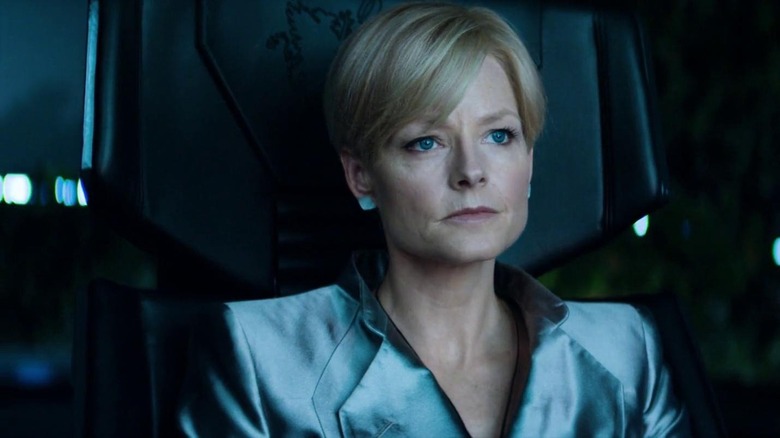Jodie Foster’s Acting Philosophy

(Jodie Foster)
Jodie Foster’s acting philosophy has evolved over a long and illustrious career, defined by both her dedication to the craft and her refusal to conform to industry expectations. With roles that span from the vulnerable young girl in Taxi Driver (1976) to the fiercely independent scientist in Contact (1997), Foster’s approach to acting is centered around authenticity, emotional truth, and intellectual depth. She consistently seeks to bring a sense of realism and humanity to every character she portrays, blending her intellect with her instincts as an actor.
1. Authenticity and Emotional Truth
At the core of Jodie Foster’s acting philosophy is her belief in authenticity. Foster emphasizes that her approach is to find the emotional truth of her characters, not just mimic what is written in the script. She strives to make each character feel real, regardless of how fictional or extraordinary the story might be. In an interview with The New York Times, Foster explained:
“I never make a movie for the money or for the fame. I make movies to explore something real. I want to understand the human experience, not just tell a story.”
This perspective reveals Foster’s commitment to embodying the soul of a character rather than merely performing the role. She takes pride in portraying characters who are multi-dimensional and relatable, ensuring that their emotional journey resonates deeply with the audience.
2. The Power of Preparation
Foster has often spoken about the intense preparation that goes into her roles. She doesn’t rely on instinct alone but dives into extensive research to understand her characters. This thorough preparation includes understanding the psychological background of her character, their motivations, and how they interact with the world around them. Foster shared in an interview with Variety:
“I believe that acting is about preparation, about getting into the mind of the character, and then letting it go when you step on the set. The more prepared you are, the more freedom you have to explore on set.”
This process allows Foster to stay grounded in her characters’ realities while also embracing the spontaneity that comes with performing in front of the camera. By deeply understanding the emotional and intellectual facets of a role, she brings greater depth and complexity to her performances.
3. Choosing Roles That Challenge Her
Foster’s career is marked by her commitment to challenging herself as an actress. She gravitates toward roles that require her to step outside her comfort zone, and she’s often drawn to complex characters that demand emotional depth and intelligence. In an interview with The Guardian, she explained:
“I love playing characters who are complicated, who are not simple, who don’t fit neatly into one box. That’s what excites me about acting—exploring the complexities of human nature.”
This approach has led Foster to portray a range of diverse characters, from a traumatized young girl in The Accused (1988) to a determined astronaut in Contact (1997). Foster’s willingness to embrace roles that push the boundaries of conventional storytelling has earned her critical acclaim and allowed her to leave a lasting impact on audiences.
4. Intellectual Approach to Acting
One of the most defining aspects of Foster’s acting philosophy is her intellectual approach to the craft. Foster, who is highly educated and has a degree in literature from Yale, applies a thoughtful, analytical approach to her roles. She often discusses her characters’ psychological, emotional, and philosophical depth before stepping into a role, and she finds great satisfaction in bringing complex, often underrepresented, characters to life.
In a conversation with NPR, Foster said:
“When I approach a role, I look at it through an intellectual lens first. I want to know what makes the character tick. Then I let the emotions come through. But I always start with the mind.”
This methodical approach allows her to build fully realized characters who are multifaceted and relatable. It also speaks to her desire to contribute to thoughtful, nuanced storytelling that challenges audiences to think deeply about the material.
5. Empowerment Through Control and Independence
As both an actress and a director, Foster has consistently sought out creative control over the projects she is involved in. She has a reputation for being selective about her roles and directing projects that align with her personal values. Foster’s decision to direct films like Little Man Tate (1991) and The Beaver (2011) stems from her belief in the power of storytelling and the need to take charge of her career trajectory.
Foster shared her philosophy on empowerment in an interview with IndieWire:
“I’ve always been interested in the balance of control and freedom. The best way to express myself is by having the freedom to direct. Acting is a part of that, but directing gives me a chance to create the world I want to explore.”
Her career choices reflect this mindset, as she seeks out projects that allow her to explore unique stories and, when possible, guide others in the creative process.
6. The Impact of Fear and Vulnerability
Foster has been open about the role fear and vulnerability play in her craft. Rather than shying away from these feelings, she embraces them, recognizing that they allow her to connect more deeply with her characters. In an interview with The Hollywood Reporter, Foster acknowledged:
“The best performances come when you’re not afraid to be vulnerable, to show your fears. I think the key is to let go of the need for perfection. If you can do that, you’ll find something real.”
This willingness to embrace vulnerability and fear is evident in many of Foster’s roles, where she portrays characters who undergo immense personal struggles and growth. Her ability to convey these moments with honesty is one of the reasons she is so revered as an actress.
Conclusion
Jodie Foster’s acting philosophy is rooted in authenticity, intellectual curiosity, and a commitment to emotional truth. She approaches her craft with a deep respect for the characters she portrays, believing that acting is not just about playing a role but about exploring the complexities of human nature. Her willingness to push boundaries, challenge herself, and embrace vulnerability has made her one of the most respected and versatile actors of her generation. Foster’s approach to acting continues to inspire those who believe that great performances come from a place of honesty, preparation, and personal growth.




